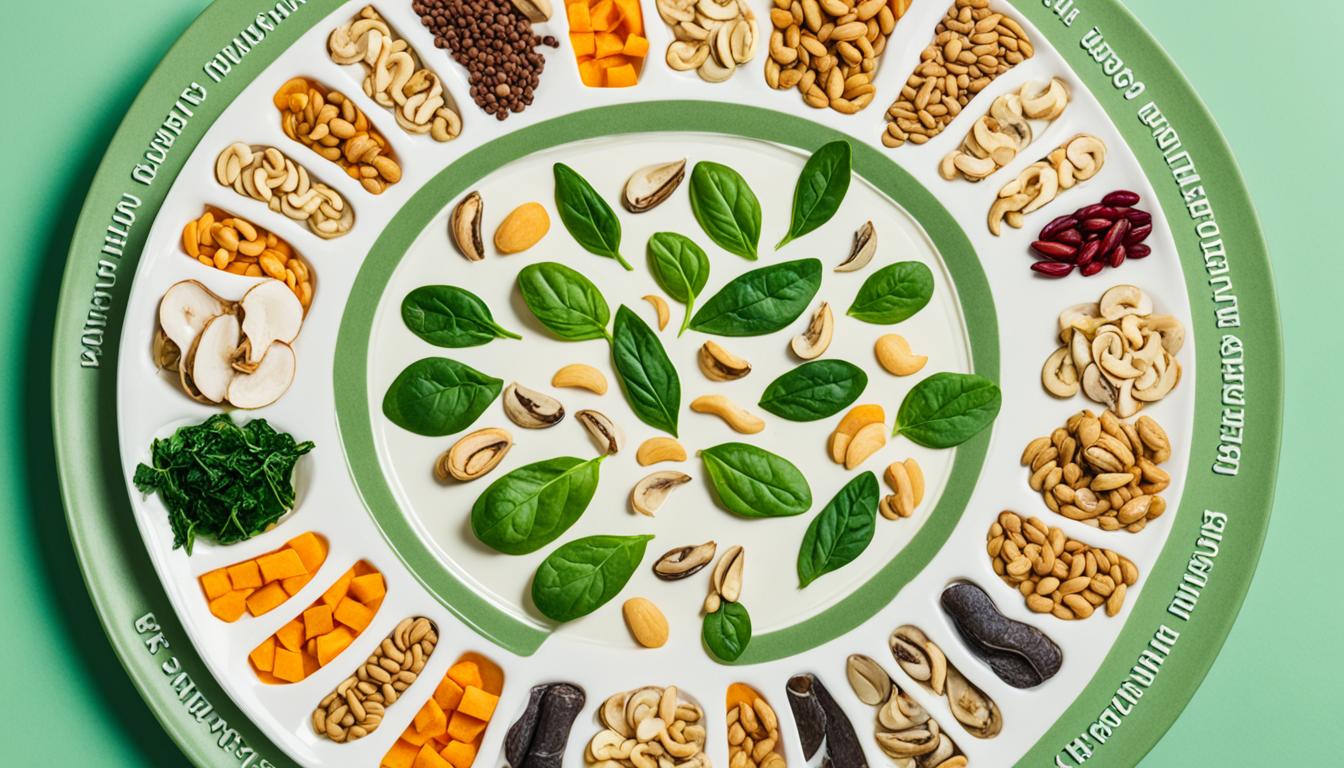Why Vitamin C is important
Did you know that vitamin C is a powerhouse nutrient that offers a multitude of health benefits? From strengthening the immune system to promoting heart health and rejuvenating the skin, this essential vitamin plays a vital role in keeping your body in optimal condition. Whether obtained from food sources or supplements, vitamin C is a key player in maintaining your overall well-being.
Key Takeaways:
- Vitamin C is an essential vitamin that provides numerous health benefits.
- It strengthens the immune system, supports heart health, and improves skin health.
- Food sources rich in vitamin C include citrus fruits, berries, and vegetables.
- Vitamin C supplements can be used to meet daily requirements.
- Consult with a healthcare professional for personalized dosage recommendations and considerations.
Immune System Boost:
Vitamin C is a powerful nutrient that plays a crucial role in supporting and boosting the immune system. It has been well-known for its ability to enhance the body’s defenses against infections and illnesses. Adequate intake of vitamin C is essential for maintaining a strong immune system and reducing the risk of common ailments.
One of the key functions of vitamin C is its role in stimulating the production and function of white blood cells, which are responsible for fighting off harmful pathogens and protecting the body against infections. These white blood cells, such as lymphocytes and neutrophils, play a vital role in the immune response.
When the body is deficient in vitamin C, the immune system may become weakened, making it more susceptible to infections. Vitamin C deficiency can lead to impaired immune function and an increased risk of developing illnesses. It is therefore important to ensure an adequate intake of vitamin C to support optimal immune system functioning.
Did you know? Vitamin C deficiency can result in a condition known as scurvy, characterized by fatigue, weakness, swollen and bleeding gums, and poor wound healing. In severe cases, scurvy can be life-threatening.
The Importance of Vitamin C For Immune Health
Vitamin C plays a crucial role in maintaining the overall health and efficiency of the immune system. It acts as an antioxidant, helping to protect immune cells from damage caused by harmful free radicals. Additionally, vitamin C supports the production of antibodies, proteins that recognize and neutralize foreign invaders like bacteria and viruses.
Furthermore, vitamin C is involved in the production of collagen, a protein that is essential for the proper functioning of connective tissues, including those found in the skin and blood vessels. Collagen helps maintain the integrity of the skin, making it an important barrier against pathogens. By promoting the production of collagen, vitamin C indirectly contributes to a healthy immune system.
The Role of Vitamin C in Immune Function
Research has shown that vitamin C supplementation can help reduce the duration and severity of common viral respiratory infections, such as the common cold. It has also been found to enhance the activity and function of immune cells, helping the body mount a more effective immune response.
“Vitamin C is essential for a properly functioning immune system. It supports the production and activity of immune cells, and its antioxidant properties help protect against cellular damage.” – Dr. Jane Adams, Immunologist
Consuming vitamin C-rich foods, such as citrus fruits, strawberries, peppers, and leafy greens, is an excellent way to boost your immune system naturally. However, for those who may have difficulty meeting their daily vitamin C needs through diet alone, supplements can be a convenient option to ensure adequate intake.
Recommended Daily Intake of Vitamin C
The recommended daily intake of vitamin C varies depending on age, sex, and life stage. In general, adults are advised to consume around 75–90 milligrams of vitamin C per day, while pregnant and breastfeeding women may require higher amounts.
However, it is essential to note that excessive intake of vitamin C through supplements can lead to potential side effects, such as gastrointestinal discomfort and diarrhea. It is always best to consult with a healthcare professional before starting any new dietary supplement regimen.
Remember, maintaining a healthy and balanced diet that includes a variety of fruits and vegetables is the best way to ensure an adequate intake of vitamin C and support a strong immune system.
Heart Health Support
Vitamin C plays a crucial role in supporting heart health by acting as an antioxidant and reducing oxidative stress, which can contribute to the development of chronic diseases like heart disease.
Studies have shown that adequate vitamin C intake can help lower blood pressure levels, reducing the risk of hypertension and cardiovascular problems.
While vitamin C can be beneficial for heart health, it’s important to note that it should not be relied upon as the sole treatment for heart conditions.
| Benefit | Explanation |
|---|---|
| Reduces oxidative stress | Vitamin C acts as an antioxidant, neutralizing harmful free radicals that contribute to heart disease and other chronic conditions. |
| Lowers blood pressure | Regular intake of vitamin C has been associated with reduced blood pressure levels, reducing the risk of hypertension and cardiovascular problems. |
| Supports overall heart health | Vitamin C plays a vital role in maintaining the health and function of blood vessels, promoting optimal heart function. |
It’s important to incorporate vitamin C-rich foods into your diet and consult with a healthcare professional for personalized advice on maintaining a healthy heart.
Skin Health and Anti-Aging Effects
Vitamin C is not just essential for your overall health, but it also plays a significant role in maintaining the health and appearance of your skin. With its numerous benefits, vitamin C has become a popular ingredient in skincare products.
One of the key benefits of vitamin C for the skin is its ability to stimulate collagen production. Collagen is a protein that helps keep the skin firm, elastic, and smooth. As we age, collagen production naturally decreases, leading to the formation of wrinkles and sagging skin. By incorporating vitamin C into your skincare routine, you can support collagen synthesis and promote a more youthful complexion.
Additionally, vitamin C acts as a powerful antioxidant for the skin. It helps neutralize free radicals, which are molecules that can cause oxidative damage to skin cells. Free radicals are often generated by environmental factors such as UV radiation, pollution, and stress. By protecting the skin from these harmful agents, vitamin C helps maintain its natural radiance and prevent premature aging.
Regular use of vitamin C in skincare products can provide a range of benefits, including:
- Improved skin texture
- Reduced appearance of fine lines and wrinkles
- Enhanced skin hydration
- Brightened complexion
- Diminished hyperpigmentation and dark spots
- Faded acne scars
Whether you choose a vitamin C serum, moisturizer, or face mask, incorporating this powerful antioxidant into your skincare routine can help rejuvenate and protect your skin.
Adding Image Description for Accessibility: A container of vitamin C serum with a dropper, surrounded by fresh oranges.
Protection Against Chronic Diseases
Vitamin C is an essential nutrient that offers a range of health benefits. One of its key roles is its ability to protect against chronic diseases. Its powerful antioxidant properties help neutralize free radicals, which can cause cellular damage and contribute to the development of conditions like cancer and other chronic diseases.

Research has shown that a diet rich in fruits and vegetables containing vitamin C is associated with a reduced risk of certain cancers. Consuming these vitamin C-rich foods provides the body with a natural defense system against the harmful effects of free radicals. Additionally, vitamin C has been found to support the body’s natural detoxification processes, further reducing the risk of chronic diseases.
“The role of vitamin C in protecting against chronic diseases cannot be overstated. Its antioxidant properties are instrumental in neutralizing free radicals and supporting the body’s overall health.” – Dr. Emily Thompson, Nutrition Specialist
However, it is important to note that while a diet rich in vitamin C is beneficial, the same protective effect has not been observed with vitamin C supplements. Studies have not consistently shown a reduced risk of chronic diseases with vitamin C supplementation alone. It is best to obtain vitamin C from natural food sources to maximize its health benefits.
The Role of Vitamin C in Cancer Prevention
Several studies have explored the potential role of vitamin C in preventing cancer. Vitamin C’s powerful antioxidant properties and its ability to stimulate the immune system make it a promising nutrient for cancer prevention.
While the research is still ongoing, some studies suggest that vitamin C may help reduce the risk of certain types of cancer, such as lung, breast, and colorectal cancers. Vitamin C’s antioxidant activity helps neutralize free radicals, which can damage DNA and promote the growth of cancer cells.
However, it’s important to emphasize that vitamin C should not be considered a standalone treatment for cancer. It is always recommended to consult with a healthcare professional for a comprehensive approach to cancer prevention and treatment.
Vitamin C and Chronic Disease Prevention
Chronic diseases, such as cardiovascular disease, diabetes, and neurodegenerative disorders, are a global health concern. While vitamin C’s role in preventing these diseases is still being studied, its antioxidant properties are believed to play a significant role in reducing the risk.
Vitamin C’s ability to neutralize free radicals and reduce oxidative stress may help protect against the development of chronic diseases. Additionally, vitamin C supports immune function, which is essential for overall health and disease prevention.
| Chronic Disease | Vitamin C Benefits |
|---|---|
| Heart Disease | Reduces oxidative stress and lowers blood pressure. |
| Diabetes | Improves insulin sensitivity and protects against complications. |
| Neurodegenerative Disorders | Supports brain health and reduces the risk of cognitive decline. |
While more research is needed to fully understand the extent of vitamin C’s benefits in chronic disease prevention, incorporating vitamin C-rich foods into your diet can be a proactive step towards promoting optimal health.
Support for Healthy Vision
Vitamin C plays an important role in maintaining healthy vision and protecting against eye diseases. One of the key conditions that vitamin C helps prevent is age-related macular degeneration (AMD), which is a leading cause of vision loss in older adults.
Research has shown that vitamin C, in combination with other vitamins and minerals, can help slow down the progression of AMD. By neutralizing free radicals in the eyes, vitamin C prevents oxidative damage and reduces the risk of developing this debilitating condition.
While the exact mechanisms of how vitamin C protects against AMD are still being studied, it is believed that the antioxidant properties of vitamin C play a crucial role in maintaining the health of the retina and macula, which are vital for clear vision.
The Importance of Vitamin C for Eye Health:
AMD is a degenerative eye disease that affects the central part of the retina, known as the macula. It causes gradual vision loss, making it more challenging to read, recognize faces, and perform daily tasks that require clear vision.
To understand the significance of vitamin C in eye health, it’s essential to recognize its role in preventing oxidative stress. The eyes are constantly exposed to environmental factors that produce harmful free radicals, such as ultraviolet (UV) radiation from the sun, pollution, and smoke.
Free radicals can damage the cells and tissues in the eyes, contributing to the development of various eye diseases, including AMD. Vitamin C acts as an antioxidant and helps neutralize these free radicals, protecting the eyes from oxidative damage and reducing the risk of vision loss.
Combined Effects of Vitamins and Minerals:
Research suggests that the synergistic effects of combining vitamins and minerals can have a more significant impact on preventing eye diseases than taking vitamin C alone.
Studies have shown that vitamins C, E, and A, along with minerals like zinc and copper, can work together to protect against AMD and other eye conditions. The Age-Related Eye Disease Study (AREDS) is a landmark study that found a significant reduction in the progression of AMD in individuals taking specific combinations of these nutrients.
These findings highlight the importance of a balanced diet and the inclusion of a variety of fruits and vegetables rich in vitamins and minerals to support overall eye health.
Vitamin C-Rich Foods for Healthy Vision :
Incorporating vitamin C-rich foods into your diet can provide the necessary nutrients to support healthy vision. Some of the best food sources of vitamin C include:
- Oranges, grapefruits, and other citrus fruits
- Strawberries
- Kiwi
- Bell peppers
- Broccoli
- Leafy green vegetables like kale and spinach
By regularly consuming these foods, you can ensure an adequate intake of vitamin C to support your eye health and reduce the risk of age-related macular degeneration and other eye diseases.
Aid in Iron Absorption :
Vitamin C plays a crucial role in aiding iron absorption in the body. This is particularly important for individuals who may be at risk of iron deficiency anemia, such as those following a vegetarian or vegan diet. Iron is an essential mineral responsible for carrying oxygen throughout the body, and a deficiency can lead to fatigue, weakness, and other symptoms.
Non-heme iron, which is found predominantly in plant-based sources, can be more difficult for the body to absorb compared to heme iron found in meat and seafood. However, consuming vitamin C-rich foods or supplements alongside iron-rich foods can enhance the absorption of non-heme iron.
By including vitamin C in your meals, you can improve the bioavailability of iron from plant sources, such as leafy greens, lentils, and legumes. This can help reduce the risk of iron deficiency anemia and ensure your body has an adequate supply of this vital mineral.
Enhancing Iron Absorption with Vitamin C :
To optimize your iron absorption, try incorporating the following strategies into your diet:
- Include vitamin C-rich foods in your meals, such as citrus fruits (oranges, grapefruits), berries (strawberries, raspberries), kiwi fruit, and bell peppers. These can help boost the absorption of iron from plant-based sources.
- Pair iron-rich foods with foods high in vitamin C. For example, have a spinach salad with strawberries or add bell peppers to your lentil stew.
- Consider taking a vitamin C supplement alongside your iron supplement, if advised by a healthcare professional.

“Vitamin C plays a crucial role in enhancing the absorption of non-heme iron, which is especially beneficial for individuals following a vegetarian or vegan diet.” – Dr. Jane Thompson, Registered Dietitian
By taking these steps to improve iron absorption, you can support your body’s overall health and reduce the risk of iron deficiency anemia. However, it’s always important to consult with a healthcare professional for personalized advice based on your specific needs and circumstances.
Potential Prevention of Gout Attacks :
Gout is a type of arthritis caused by the crystallization of uric acid in the joints. It can be incredibly painful and debilitating, affecting the quality of life for those who suffer from it. However, there is evidence to suggest that vitamin C may play a role in reducing the risk of gout attacks.
Multiple studies have found that higher vitamin C intake is associated with lower levels of uric acid in the blood, which can lead to a decreased risk of gout. Vitamin C has been shown to increase the excretion of uric acid from the body, preventing its accumulation in the joints.
| Vitamin C Dosage | Gout Attack Risk |
|---|---|
| Below recommended daily intake | Increased risk of gout attacks |
| Within recommended daily intake | Potentially reduced risk of gout attacks |
| Above recommended daily intake | Further research needed to determine optimal dosage |
While these findings are promising, it’s important to note that more research is needed to determine the optimal vit C dosage for preventing gout attacks. Additionally, vitamin C supplementation should be done in consultation with a healthcare professional to ensure it’s appropriate for your individual needs and overall health.
“Vitamin C may offer a natural and accessible way for individuals with gout to potentially reduce their risk of painful attacks. However, it’s essential to consult with a healthcare professional before implementing any new treatment or supplementation.” – Dr. Amanda Thompson, Rheumatologist
It’s worth noting that vit C should be incorporated as part of a comprehensive approach to managing gout. This includes a healthy diet, regular exercise, and managing other contributing factors such as alcohol consumption and weight management.
Overall, while vitamin C shows potential for preventing gout attacks, it should be approached as a complementary strategy alongside other lifestyle modifications and in consultation with a healthcare professional.
Cautions and Considerations :
Vitamin C is generally safe for most individuals and offers numerous health benefits. However, it’s important to be aware of potential side effects and consider certain precautions when using this vitamin. Here are some key points to keep in mind:
1. Side Effects of High Doses
While vit C is generally well-tolerated, consuming excessive amounts can lead to certain side effects. Common side effects of high doses include:
- Gastrointestinal distress
- Diarrhea
- Kidney stones
To avoid these side effects, it’s important to stay within the recommended daily allowance of vit C. Consult a healthcare professional or refer to dietary guidelines to determine the appropriate dosage for your specific needs.
2. Consultation with Healthcare Professional
Before starting any new supplement regimen, it is advisable to consult with a healthcare professional. They can assess your overall health, evaluate any potential interactions with medications you may be taking, and provide guidance on the appropriate dosage of vit C.
3. Caution for Certain Medical Conditions
Individuals with certain medical conditions should exercise caution when taking vit C supplements. Here are a few examples:
- Kidney Disease: People with kidney disease may need to limit their intake of vit C, as high doses can put additional strain on the kidneys.
- Hemochromatosis: This hereditary condition causes the body to absorb too much iron, and high doses of vitamin C can enhance iron absorption. It is important for individuals with hemochromatosis to discuss vit C supplementation with their healthcare provider.
When in doubt, always consult a healthcare professional before taking vit C supplements, especially if you have any pre-existing medical conditions.
Remember, while vit C offers numerous health benefits, it is essential to prioritize moderation and individual needs when incorporating it into your health routine.

| Side Effects | Precautions |
|---|---|
| Gastrointestinal distress | Stay within recommended dosage |
| Diarrhea | Consult with a healthcare professional |
| Kidney stones | Avoid high doses with kidney disease |
Food Sources of Vitamin C
Vitamin C is an essential nutrient that plays a vital role in supporting overall health and well-being. To ensure an adequate intake of this important vitamin, it’s essential to include vitamin C-rich foods in your diet. Fortunately, there are numerous delicious options available that can help boost your vitamin C levels.
One of the most well-known sources of vitamin C is citrus fruit. Oranges, lemons, and grapefruits are not only refreshing and tangy but also packed with vitamin C. They make a great addition to your breakfast or can be enjoyed as a snack throughout the day.
But citrus fruits aren’t the only way to get your daily dose of vitamin C. There are plenty of other fruits that are rich in this essential nutrient. Kiwis, strawberries, and tomatoes are all excellent sources of vitamin C, adding a burst of flavor and color to your meals or salads.
When it comes to vegetables, bell peppers are a standout source of vit C. The vibrant red, yellow, and green peppers not only add a delightful crunch to your dishes but also provide a significant amount of vit C. Broccoli, Brussels sprouts, and cabbage are other vegetable options that can help boost your vit C levels while adding variety to your meals.
Remember, incorporating these vitamin C-rich foods into your diet can help ensure that you’re meeting your recommended daily intake of this essential vitamin. So, why not get creative with your meal planning and explore different recipes that feature these nutritious ingredients?
Vitamin C-Rich Foods
| Fruits | Vitamin C Content (Per 100g) |
|---|---|
| Oranges | 53mg |
| Kiwis | 92.7mg |
| Strawberries | 58.8mg |
| Tomatoes | 23.2mg |
| Vegetables | Vitamin C Content (Per 100g) |
|---|---|
| Bell Peppers | 80.4mg |
| Broccoli | 89.2mg |
| Brussels Sprouts | 85mg |
| Cabbage | 36.6mg |
With these diverse options, it’s easy to incorporate a variety of vit C-rich foods into your diet. Whether it’s a fresh and zesty citrus fruit salad or a colorful stir-fry packed with bell peppers and broccoli, these foods will not only tantalize your taste buds but also provide you with the essential vit C your body needs.
Vitamin C Supplements :
While it’s ideal to get vit C from whole foods, supplements can be a convenient option. When choosing a vitamin C supplement, look for reputable brands that provide high-quality products. The dosage of vit C supplements may vary depending on individual needs and health conditions. It’s essential to follow the recommended dosage instructions and consult with a healthcare professional if you have any concerns or specific requirements.
Key Considerations for Choosing the Best Vitamin C Products:
- Research reputable brands known for their commitment to quality and safety.
- Look for supplements that contain natural vitamin C derived from food sources.
- Consider supplements with additional nutrients that enhance vitamin C absorption.
- Check for third-party certifications to ensure product potency and purity.
Vitamin C Dosage Guidelines:
The recommended daily intake of vit C varies depending on age, sex, and life stage. Here are the general guidelines for vitamin C dosage:
| Life Stage | Age Group | Recommended Daily Intake |
|---|---|---|
| Infants | 0-6 months | 40 mg |
| 7-12 months | 50 mg | |
| Children | 1-3 years | 15 mg |
| 4-8 years | 25 mg | |
| Adolescents | 9-13 years | 45 mg |
| 14-18 years | 75 mg (boys) 65 mg (girls) |
|
| Adults | Men | 90 mg |
| Women | 75 mg | |
| Pregnancy | 14-18 years | 80 mg |
| 19+ years | 85 mg | |
| Lactation | 14-18 years | 115 mg |
| 19+ years | 120 mg |
It’s important to note that individual requirements may vary based on factors such as overall health, underlying medical conditions, and pregnancy or breastfeeding status. Always consult with a healthcare professional to determine the best vitamin C dosage for your specific needs.
therefore,
Vitamin C offers a wide range of health benefits that can help support overall well-being. Its role in boosting the immune system, promoting heart health, and rejuvenating the skin makes it a valuable nutrient to incorporate into your daily routine.
While vit C can be obtained from various food sources, such as citrus fruits, kiwi, bell peppers, and broccoli, supplements can also be used to meet your daily requirements. However, it is crucial to follow the recommended dosage and consult with a healthcare professional to ensure safety and efficacy.
Remember, vit C is not a cure-all and should not replace a balanced diet or medical advice. It is always best to consider individual health factors and consult with a healthcare professional before starting any new supplement regimen.
By incorporating vit C into your lifestyle responsibly, you can harness its numerous health benefits and support your overall well-being.
FAQ
What are the benefits of vitamin C?
How does vitamin C boost the immune system?
Can vitamin C improve heart health?
What are the skin benefits of vitamin C?
Can vitamin C protect against chronic diseases?
Does vitamin C support healthy vision?
How does vitamin C aid in iron absorption?
Can vitamin C prevent gout attacks?
Are there any side effects of vitamin C?
What are the food sources of vitamin C?
Should I take vitamin C supplements?









